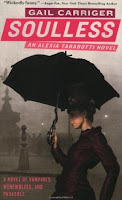I found this novel refreshing in its portrayal of vampires and werewolves. It was something akin to what I 'grew up on' regarding those two genres. The idea at the bottom is that these supernatural beings are people first, monsters second. Sure, werewolves completely lose control of their higher brain functions during the full moon and would just as soon tear you apart as look at you, and sure vampires still need blood to survive, but these, shall we say, defects do not prevent them from fitting in with civilized society.
When I say I 'grew up on' vampires and werewolves, I'm talking about two years at the end of high school, so I wasn't exactly a little kid. One October, my friend James said, "Dan, you're coming to Game with us," and there was simply no saying otherwise. I was introduced to White Wolf's World of Darkness live-action roleplaying games, specifically Vampire: The Masquerade and Werewolf: The Apocalypse. Friday nights, I would gather on campus with about thirty other people and we would run around with character sheets in our back pockets, playing make-believe that we were bloodthirsty, if angsty, creatures of the night.
When I say I 'grew up on' vampires and werewolves, I'm talking about two years at the end of high school, so I wasn't exactly a little kid. One October, my friend James said, "Dan, you're coming to Game with us," and there was simply no saying otherwise. I was introduced to White Wolf's World of Darkness live-action roleplaying games, specifically Vampire: The Masquerade and Werewolf: The Apocalypse. Friday nights, I would gather on campus with about thirty other people and we would run around with character sheets in our back pockets, playing make-believe that we were bloodthirsty, if angsty, creatures of the night.
I have no delusions that this was a terribly fulfilling way to spend my Friday nights, of course, but it was a lot of fun at the time, and perhaps more importantly, White Wolf's take on supernatural horror has colored my perceptions of them ever since. When it comes to werewolves, I'm simply a werewolf fan. I go to movies to get a good transformation scene and cheer on the puppies, whether they're ripping people apart or trying to save the world.
Portrayals of vampires tend to irritate me more. Mindless, killable leeches are not interesting, and mopey uber-goths are annoying. There seems to be little deviation in mainstream media from these two tropes, Twilight aside. Those who hide out in the shadows tend to moan about how the world hates them, and they're monsters who must feed on others, and they never wanted this curse, blah blah blah. Me? I always thought there would be at least something enjoyable about being bitten by one of these guys. I mean, it can't be all doom and gloom and what have I become, right?
Vampire and Werewolf, the games, were always about being people first, who had cool powers. Sure, we didn't want any normal people to find out what we really were, but that was because they all feared us. Werewolves and vampires were misunderstood, and the fearful, destructive humans would just try to kill us all, like they did in the Dark Ages! Was this marketed towards outcast teenagers who got off on feeling like special snowflakes who could rip the heads off their tormentors? Absolutely. But that doesn't change the fact that World of Darkness really did focus on the humanity of the supernatural monster, even if it was quickly slipping away in the night.
Dan Walker (pseudonym) is a writer from Northeast Ohio. He received a BA in Creative Writing from Wright State University in 2004 and a Masters in Teaching English as a Second Language from Kent State University in 2009. He is currently the editor of Lib's LIB.
LibsNote: Dan was reading a personal copy of the book.
*This post was originally written March 15, 2011 to give the regular blogger a break. She finally got around to using it after being sleep deprived for 3 days in a row. Yeah.

















